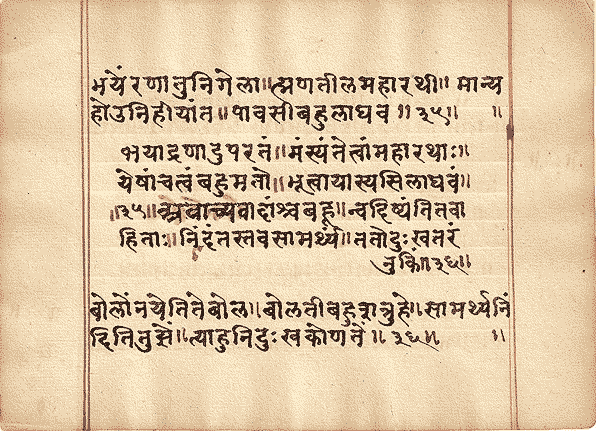
bhayād raṇād uparataṃ maṃsyante tvāṃ mahā-rathāḥ
yeṣāṃ ca tvaṃ bahu-mato bhūtvā yāsyasi lāghavam
Update RequiredTo play the media you will need to either update your browser to a recent version or update your Flash plugin.
mahā-rathāḥ (great warriors) tvām (of you) bhayāt (out of fear) raṇāt (from the battle) uparatam (as desisted) maṁsyante (they will think).
yeṣām ca (and for whom) tvam (you) bahu-mataḥ (highly esteemed) bhūtvā (after being), [
teṣām]
(among them) lāghavam (insignificance) yāsyasi (you will attain).
| bhayāt |
– |
bhaya 5n.1 n. – out of fear (from: √bhī – to scare); |
| raṇāt |
– |
raṇa 5n.1 m. – from the battle (from: √raṇ – to rejoice, raṇa – delight, fight, battle); |
| uparatam |
– |
upa-rata (upa-√ram – to desist) PP 2n.1 m. – desisted, withdrawn; |
| maṁsyante |
– |
√man (to think) Fut. Ā 1v.3 – they will think; |
| tvām |
– |
yuṣmat sn. 2n.1 – of you; |
| mahā-rathāḥ |
– |
mahā-ratha 1n.3 m.; BV: yeṣāṁ rathā mahāntaḥ santi te – those who have great chariots (from: √mah – to magnify, mahant – great; ratha – chariot); |
| yeṣām |
– |
yat sn. 6n.3 m. – of whom; |
| ca |
– |
av. – and; |
| tvam |
– |
yuṣmat sn. 1n.1 – you; |
| bahu-mataḥ |
– |
bahu-mata 1n.1 m. – bahu mata iti – highly esteemed (from: bahu av. – much, great; √man – to think, PP mata – regarded, esteemed); |
| bhūtvā |
– |
√bhū (to be) absol. – after being; |
| yāsyasi |
– |
√yā (to go, to attain) Fut. P 2v.1 – you will attain; |
| lāghavam |
– |
lāghava 2n.1 n. – lightness, insignificance (from: laghu – light, small); |
maṃsyante → manyaṃte (they think);
tvāṁ → tvā (you);
yeṣāṁ → eṣāṁ / keṣāṁ (of those / of whom?);
The key:
an excerpt from the commented verse
quotes from the scriptures
starting polemic
|
Moreover,
|
|
kiṃ ca – |
|
The great car-warriors will think thou hast withdrawn from the battle through fear;
and, having been (hitherto) highly esteemed by them, thou wilt incur their contempt.
|
|
bhayād raṇād uparataṃ maṃsyante tvāṃ mahārathāḥ |
yeṣāṃ ca tvaṃ bahumato bhūtvā yāsyasi lāghavam ||2.35|| |
|
Duryodhana and others – warriors fighting in great cars – will think that you have withdrawn from the battle through fear of Kama and others, but not through compassion. – Who are they that will think so? – The very persons, Duryodhana and others, by whom you have been esteemed as possessed of many noble qualities. Having been thus esteemed, you will again grow very small (in their estimation).
|
|
bhayāt karṇādibhyaḥ raṇāt yuddhāt uparataṃ nivṛttaṃ maṃsyante cintayiṣyanti na kṛpayeti tvāṃ mahārathāḥ duryodhana-prabhṛtayaḥ | yeṣāṃ ca tvaṃ duryodhanādīnāṃ bahu-mato bahubhir guṇair yuktaḥ ity evaṃ mataḥ bahumato bhūtvā punar yāsyasi lāghavaṃ laghu-bhāvam ||2.35|| |
bandhu-snehāt kāruṇyāc ca yuddhān nivṛttasya śūrasya mamākīrtiḥ katham āgāmiṣyatity atrāha—bhayād iti | yeṣāṃ karṇa-duryodhanādīnāṃ mahārathānām itaḥ pūrvaṃ tvaṃ śūre vairī iti bahumato bhūtvā idānīṃ yuddhe samupasthite nivṛttavyāpārtayā lāghavaṃ sugrahatāṃ yāsyasi | te mahārthāḥ tvāṃ bhayād yuddhād upartaṃ maṃsyante | śūraṇāṃ hi viriṇāṃ śatrubhayād ṛte bandhusnehādinā yuddhād upartiḥ nopapadyate
kiṃ ca bhayād iti | yeṣāṃ bahu-guṇatvena tvaṃ pūrvaṃ sammato ‚bhūs ta eva bhayāt saṃgrāmān nivṛttaṃ tvāṃ manyeran | tataś ca pūrvaṃ bahumato bhūtvā lāghavam laghutāṃ yāsyasi
komentarz wspólny przy wersecie BhG 2.36
yeṣāṃ tvaṃ bahu-mato ‚smac-chatrur arjunas tu mahāśūra iti bahu-saṃmāna-viṣayo bhūtvā samprati yuddhād uparame sati lāghavaṃ yāsyasi te duryodhanādayo mahārathās tvāṃ bhayād eva raṇād uparataṃ maṃsyanta ity anvayaḥ | kṣatriyāṇāṃ hi bhayaṃ vinā yuddhoparati-hetur bandhu-snehādiko nopapadyata iti matveti bhāvaḥ
nanu kula-kṣaya-doṣāt kāruṇyāc ca vinivṛttasya mama katham akīrtiḥ syād iti cet tatrāha bhayād iti | mahārathā duryodhanādayas tvāṃ karṇādi-bhayān na tu bandhu-kāruṇyād raṇād uparataṃ maṃsyante | na hi śūrasya śatru-bhayaṃ vinā bandhu-snehena yuddhād uparatir ity arthaḥ | itaḥ pūrvaṃ yeṣāṃ tvaṃ bahumataḥ śūro vairīti bahu-guṇavattayā saṃmato ‚bhūr idānīṃ yuddhe samupasthite kātaro ‚yaṃ vinivṛtta ity evaṃ tat-kṛtaṃ lāghavaṃ duḥsahaṃ yāsyasi

